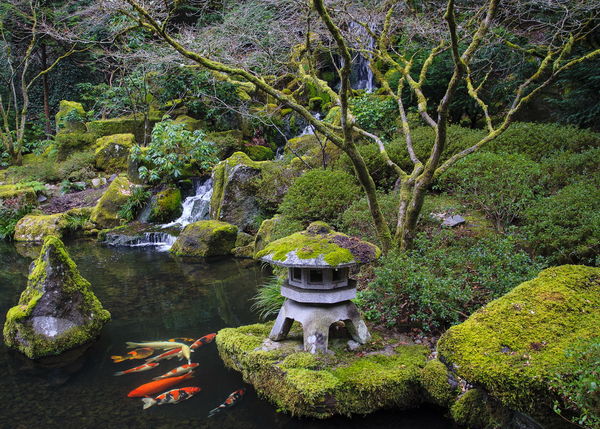How to remove so much reflection in water?
Nov 16, 2014 21:41:49 #
Greenguy33 wrote:
Is it simply putting a circular polarizer on the lens to remove all the reflections on a river or lake?
There are times when I feel reflections are just too much.
I'll post one of my pics that I think would be better as a clear or black water.
There are times when I feel reflections are just too much.
I'll post one of my pics that I think would be better as a clear or black water.
What happens when you add polarization in PP?
Nov 16, 2014 22:27:45 #
Danilo wrote:
I'm not assuming a desired result in the image cre... (show quote)
Thanks for that explanation Danilo. Here is an image I took on a cloudy day (Portland typical). I wish I could show you want it looked like without the polarizer, but I can't. I can only tell that the koi fish were hardly visible. The unknown degree with which my polarizer functioned was pretty good in this case. -Mark
Nov 16, 2014 22:56:51 #
As I remember college physics, a polarizing lens can be compared to a venetian blind, partially closed, that will allow straight light rays to enter, but not angled rays, typical of glare from water surfaces. This theory explains the Rt. angle direction from the sun is the greatest glare and why you have to increase the exposure 1 stop or so. You have to use CP lens on dig cameras. Polarizing lenses polarize light AFTER passing thru them. That's why Polaroid sun glasses are effective.
Nov 17, 2014 06:52:29 #
EmilMiller
Loc: Miramar, FL
You can check out this thread to see how much glare you can eliminate.
http://www.uglyhedgehog.com/t-255665-1.html
http://www.uglyhedgehog.com/t-255665-1.html
Greenguy33 wrote:
Is it simply putting a circular polarizer on the lens to remove all the reflections on a river or lake?
There are times when I feel reflections are just too much.
I'll post one of my pics that I think would be better as a clear or black water.
There are times when I feel reflections are just too much.
I'll post one of my pics that I think would be better as a clear or black water.
Nov 17, 2014 07:00:39 #
EmilMiller wrote:
You can check out this thread to see how much glare you can eliminate.
http://www.uglyhedgehog.com/t-255665-1.html
http://www.uglyhedgehog.com/t-255665-1.html
Thanks for the link. I read the explanation and saw the 2 pictures. The explanation didn't help me much. There wasn't much difference between the 2 pics. The first one had more saturation.
I want to eliminate distracting reflections in certain photo's.
Nov 17, 2014 08:23:29 #
Greenguy33 wrote:
Is it simply putting a circular polarizer on the lens to remove all the reflections on a river or lake?
There are times when I feel reflections are just too much.
I'll post one of my pics that I think would be better as a clear or black water.
There are times when I feel reflections are just too much.
I'll post one of my pics that I think would be better as a clear or black water.
I don't necessarily believe you have too much reflection. It depends on what story you are trying to tell. If there is a problem with the picture it is focused such that refection in the front is too soft aka a bit blurry. If you stopped down the shutter to say f/11 and had everything in focus, you might find the reflection more pleasing.
Nov 17, 2014 08:39:44 #
Greenguy33 wrote:
Is it simply putting a circular polarizer on the lens to remove all the reflections on a river or lake?
There are times when I feel reflections are just too much.
I'll post one of my pics that I think would be better as a clear or black water.
There are times when I feel reflections are just too much.
I'll post one of my pics that I think would be better as a clear or black water.
I like it! No improvement needed!
Nov 17, 2014 08:53:23 #
Greenguy33 wrote:
Thanks Rongnongno. I had the polarizer on, so my next move (I assume) is to adjust the angle of the camera to the water.
Should I be pointed down more at a 45 degree angle?
Will being in the woods make the polarizer less effective to the water?
Should I be pointed down more at a 45 degree angle?
Will being in the woods make the polarizer less effective to the water?
Have you attempted to rotate the polarizer and seen if this aids in your composition? The orientation of those filters to the direct image and reflection is what makes them work. If both are too close in angular difference, the polarizer may not be able to differentiate.
Nov 17, 2014 09:03:31 #
TucsonCoyote wrote:
Just a dumb question to be sure we covered all bases here.
Was that the best you could do with the polarizer or did you forget to rotate it to that point?
Was that the best you could do with the polarizer or did you forget to rotate it to that point?
I was thinking that too. Looks like a "straight" image to me. I thought that was his example w/o a filter.
My addition comments: Why would you want "black water"? You could alter that shot with Photoshop to make the water dark and with less reflection information. But I guess that would be a different question.
Nov 17, 2014 09:17:35 #
lamiaceae wrote:
I was thinking that too. Looks like a "straight" image to me. I thought that was his example w/o a filter.
My addition comments: Why would you want "black water"? You could alter that shot with Photoshop to make the water dark and with less reflection information. But I guess that would be a different question.
My addition comments: Why would you want "black water"? You could alter that shot with Photoshop to make the water dark and with less reflection information. But I guess that would be a different question.
Sometimes, reflections are beautiful. Other times, it seems to be "too much". I thought that a clear or dark water would quiet down the image and make it more tranquil.
But you are right about the CP, I think I rushed the shot without adjusting the CP.
Nov 17, 2014 09:18:19 #
Years ago with film cameras, my polarizing filter could held by hand, viewed directly at the subject and rotated to preview the amount of reflection eliminated. Attaching the filter to the camera, it could be adjusted through the viewfinder.
My digital B+W filter does not show the difference if I view it manually but does preview when attached to the camera. Big consideration here is if your camera has a viewfinder or it only has a monitor, in which case visibility in sunlight can make it hard to see the proper filter rotation. Find a workable monitor shade or carry a focusing cloth as if you were using a view camera.
It's also good for removing haze reflection on distant landscape subjects.
My digital B+W filter does not show the difference if I view it manually but does preview when attached to the camera. Big consideration here is if your camera has a viewfinder or it only has a monitor, in which case visibility in sunlight can make it hard to see the proper filter rotation. Find a workable monitor shade or carry a focusing cloth as if you were using a view camera.
It's also good for removing haze reflection on distant landscape subjects.
Nov 17, 2014 09:18:47 #
JCam wrote:
I like it! No improvement needed!
thanks for the kind words JCam.
Nov 17, 2014 09:20:00 #
Nov 17, 2014 09:27:36 #
Pablo8
Loc: Nottingham UK.
I thought the physics of polarization was taught at school!! For photography...To darken blue skies, the sun should be approx' 90 degrees to the shooting direction. When eliminating reflection from shiny surfaces (water/glass) the best effective angle is 30 degrees whether it is water on a horizontal plane, or glass/windows on a vertical plane. Why not try it out visualy on a vehicle...Looking through the filter, and rotating it, one can see the different areas of the car being affected by the filter as it is rotated. Simple lesson.
Nov 17, 2014 09:42:04 #
mdorn wrote:
What kind of filter do you have? They are not all created equal. I think the time of day may be your biggest challenge though. The image you provided is a good example of what the harsh contrast of the sun can do in wooded area. I would try again at before sunrise, right after sunset or on a cloudy day to cut the glare and reflection.
I think you are right about that too, and perhaps this is more of an issue with a PL or CPL filter. I am not really very fond of using polarizers myself but when I found a usable sized CPL (all the other old "film" days PL ones I had were only 49mm) on a lens a friend gave me I started using it on a zoom and other lenses with stepping rings. But I hate the results. All I really see is overly deep shadow areas with little detail. Seems to do little for my skies, but I get goods skies most of the time because I mainly use vintage lenses with ton of coating and contrast. The other areas where I used to use PL filters and might try again once I buy a good CPL filter is shiny objects and water (if I want to see into or under the water, usually don't).
If you want to reply, then register here. Registration is free and your account is created instantly, so you can post right away.









